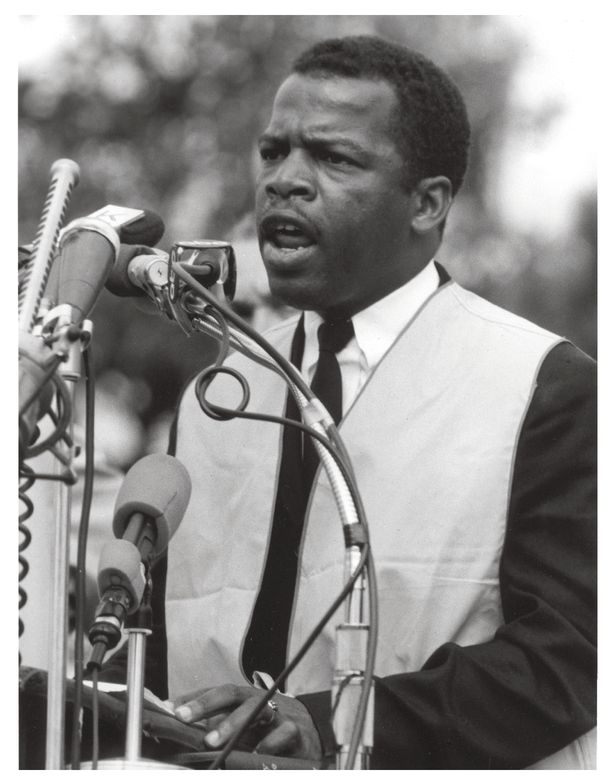DAY FIVE Thursday, March 25
Goal: Capitol Building in Montgomery
THIS TIME THERE was a send-off breakfast of eggs, creamy grits, and fried chicken made by a crew of churchwomen. As the well-fed marchers set out in a misty rain, people rushed in to join them at every intersection. They’d come to Montgomery from all over the United States, by car and plane, train and bus. Rosa Parks flew down from Detroit, Michigan, back to the city where she’d refused to give up her seat on the bus in 1955. Sheyann and her parents drove from Selma, and Lynda and Joanne’s father brought a carful.
The march swelled to 30,000. Streaming up Mobile Street to Montgomery Street, they eased around the fountain at Court Square, where Parks had boarded her bus. Up the six broad blocks of Dexter Avenue—known as Goat Hill—they surged.
In their orange vests and mud-caked shoes, Bobby and Charles were sent forward along with other students as an honor vanguard. Charles, his vest over his Hudson High sweatshirt, strutted joyfully up front. “Come and march with us,” he urged bystanders, black and white, through a megaphone. “We’re going downtown. There’s nothing to be afraid of. Come and march with us!” He turned around and looked down Goat Hill at the thousands and thousands of people walking behind him. “It was just such a glorious triumph,” he said.
Folksingers jumped up on a makeshift stage next to the capitol building. Patriotic songs blended into gospel and protest songs. “The Star-Spangled Banner” rolled into “Go Tell It on the Mountain” and “This Land Is Your Land” as the singers harmonized. Speaker after speaker addressed the crowd.
It was no surprise that Governor Wallace didn’t show up. Marchers were sure he was in his office high up in the state capitol, peeking down at them through the closed curtains. “I had some satisfaction that he was scared of me,” Lynda said. “I didn’t do anything to that big old man.”
Bobby, a few feet from the stage, was euphoric. “You be rejoicing once you accomplish your goal and get there,” he said. “I never seen so many people. It was just people galore. As far as you could see back by eyes there were people, just standing, and nobody seemed to get tired.”
Rosa Parks was coaxed up on the stage and greeted with a roar of delight.
In her soft voice, she told the crowd about her childhood memories of sitting next to her grandfather, a shot gun across his lap, as the Klan rode by on the gravel road in front of their house. She spoke briefly and then stepped away from the microphones.
Finally it was time for Dr. King. He spoke of the long, dark legacy of slavery and segregation, the triumphs of the civil rights movement, the hardships ahead. He urged—begged—everyone to remain committed to non violence as they built “a society at peace with itself.”
Today I want to tell the city of Selma, today I want to say to the state of Alabama, today I want to say to the people of America and the nations of the world, that we are not about to turn around. We are on the move now.... Like an idea whose time has come, not even the marching of mighty armies can halt us. We are moving to the land of freedom.
I come to say to you this afternoon, however difficult the moment, however frustrating the hour, it will not be long, because “truth crushed to earth will rise again.”
How long? Not long, because “no lie can live forever.”
How long? Not long, because “you shall reap what you sow.”
How long? Not long, because the arc of the moral universe is long, but it bends toward justice.
Rosa Parks addresses the crowd.
A sea of flags and marchers, seen from the impromptu stage.
King finished by reciting one of his favorite song choruses, his rich preacher’s voice rolling out over the crowd:
Glory, hallelujah! His truth is marching on!
The speeches were over. The hot days and hard pavement, the cold nights, the rain and mud were done. The defiance and exhilaration were falling away. But before they left, thirty thousand people clasped hands, swaying back and forth as they sang.
We shall overcome
We shall overcome
We shall overcome some day
Oh, deep in my heart I do believe
We shall overcome some day
People were urged to go quietly and be off the streets before dark. Victory and jubilation turned to a sudden feeling of vulnerability. Cars full of marchers hurried back to Selma. Word spread quickly when a white woman, Viola Liuzzo, was gunned down and killed by Klan members as she drove to Montgomery to pick up marchers.
ABOVE: John Lewis, wearing his vest, speaks to the crowd.
“When we returned back to Selma, we returned under a cloud of sadness,” Lynda said. “I didn’t return jubilant.” As cars pulled up in front of Brown Chapel people were rushed inside. No one knew if gunmen lurked outside, ready to strike again.




